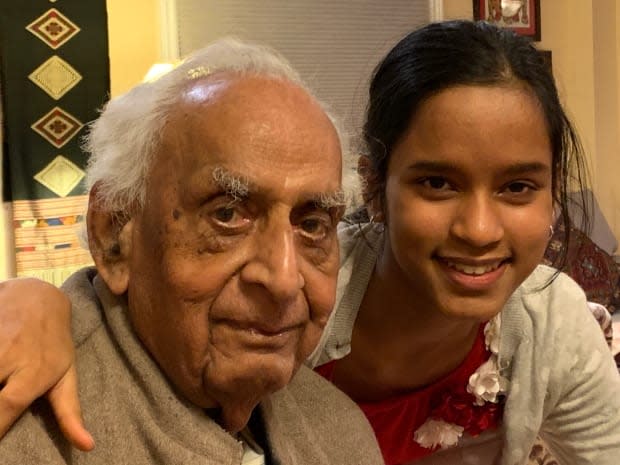'Red tape' keeps dying Kingston man from getting care, daughter says

This story is part of CBC's new pop-up bureau in Kingston, Ont. If we should know about something happening in the area, send us an email.
A Kingston, Ont., woman says her father has only weeks or months to live — but says he can't access long-term care.
She's even willing to pay for it — but under Ontario's rules, her father needs to have an OHIP card. And to get that, he needs to be a permanent resident.
"My father is caught in a bureaucratic nightmare," says Reena Kukreja.
An assistant professor of global development studies at Queen's University who studies the struggles of migrant workers, Kukreja is familiar with the barriers immigrants face in their new countries. Now it has hit home.
Her father Krishan Kukreja is 96 years old and has advanced dementia. He is currently living in Canada under a temporary visa and does not have permanent residency, so he does not have coverage under the Ontario Health Insurance Plan, or OHIP.

While through his insurance the Kingston General Hospital is able to provide Krishan emergent care, Reena says he isn't able to access palliative care or specialized geriatric psychiatry. Doctors have suggested medically supervised institutionalized care, and Reena says Providence Care Hospital is willing to take him.
Despite her willingness to pay for treatment, he can't be admitted to long-term care without an OHIP number. In Ontario, long-term care homes are provincially regulated and you need an OHIP card to be eligible, according to Ontario's guidelines.
"Their hands are tied by red tape," says Reena. "Without an OHIP number, he cannot access the services he needs for his end of life. He cannot die with dignity."
Reena applied to sponsor Krishan for permanent residency in August, but can't continue with that process until Immigration, Refugees and Citizenship Canada invites Krishan to apply for permanent residency. Krishan has not yet received an invitation despite Reena's multiple submissions.
No access to institutionalized care
Krishan came to Canada on a "grandparent super visa" from India in 2016. It required Krishan to have a pre-travel medical exam as well as a medical insurance policy from a Canadian insurance company. This visa allows holders to visit family in Canada for up to two years at a time. Reena has renewed it since, and his current visa is valid until March 2023.
Reena described Krishan as a devoted family man who loved spending time with his granddaughter, and loved Canada and "embraced everything here with great gusto." A mechanical engineer by trade, Krishan remained active into his nineties — reading, birdwatching, cottaging, and mingling at the seniors centre.
Her father was healthy, Reena says, until he was hospitalized with a "silent" urinary tract infection in November 2021. These infections often show no symptoms, and the family was unaware he was ill until he started displaying symptoms of delirium.
His mental state declined rapidly to the point where he required around-the-clock care at home, says Reena. But Krishan's dementia quickly progressed, and he now needs institutionalized care.
"He's become aggressive. He's showing extreme paranoia, and it's dangerous for him to be kept at home," she said.
Sending him back to India for care is also not an option — Krishan has no living family in India to care for him, and he's not medically fit to fly, she said.
Insurance 'often useless', says expert
The insurance policy Reena purchased for Krishan covers emergency care, but doesn't provide "continuing coverage".
A representative of JF Insurance Agency Group said in a Dec. 6 letter the insurer will not provide any coverage "for any further consultations, diagnostics or treatments" as "the initial treatment is over."
The limit in coverage is not surprising, said Dr. Paul Caulford, a family physician and founder of the Canadian Centre for Refugee & Immigrant Health Care.
Most insurance policies offered to immigrants with super visas are "often useless" due to their narrow scope of coverage, says Caulford.
"The policies we've seen purchased are ineffective in the vast majority of cases."
Even if JF Insurance was willing to cover the bill for institutionalized care, Reena says the Ontario Local Health Network cannot place Krishan in a facility without an OHIP number.
JF Insurance did not respond to CBC's interview request.

Appeals made to province
The Kukreja family has been working with the office of Kingston and the Islands MPP Ian Arthur, who applied to the OHIP Eligibility Review Committee on Krishan's behalf, but were denied.
The committee said in a letter on March 8 that Krishan can't receive OHIP until Immigration, Refugees and Citizenship Canada confirms Krishan is eligible for permanent residency.
In his 23 years of working with immigrants who have been denied OHIP coverage, Caulford says they have made countless appeals to the OHIP Eligibility Review Committee— all of which were denied.
"We've never had a case adjudicated in favour of the individual," he said.
This leaves the Kukreja family with one remaining option-- a compassionate exemption granting him OHIP coverage. These can only be granted by the Minister of Health.

Dr. Caulford says he has never succeeded in getting a patient a compassionate exemption, and doesn't know anyone who has.
MPP Ian Arthur says he is calling on Minister of Health Christine Elliott to allow Krishan OHIP coverage so he can access the care he needs.
"My heart is breaking for Mr. Kukreja and his family," said Arthur in an email to CBC. "No individual or family should have to be in this situation, where an incredibly difficult situation is made that much harder by being unable to access health care, long-term care, or end of life care."
The Ministry of Health did not respond to CBC's request for comment.
Reena hopes a solution can be worked out soon.
"We, as Canada, cannot project ourselves as great leaders overseas when we fail people who come to our shores," she said.

 Yahoo Sports
Yahoo Sports 